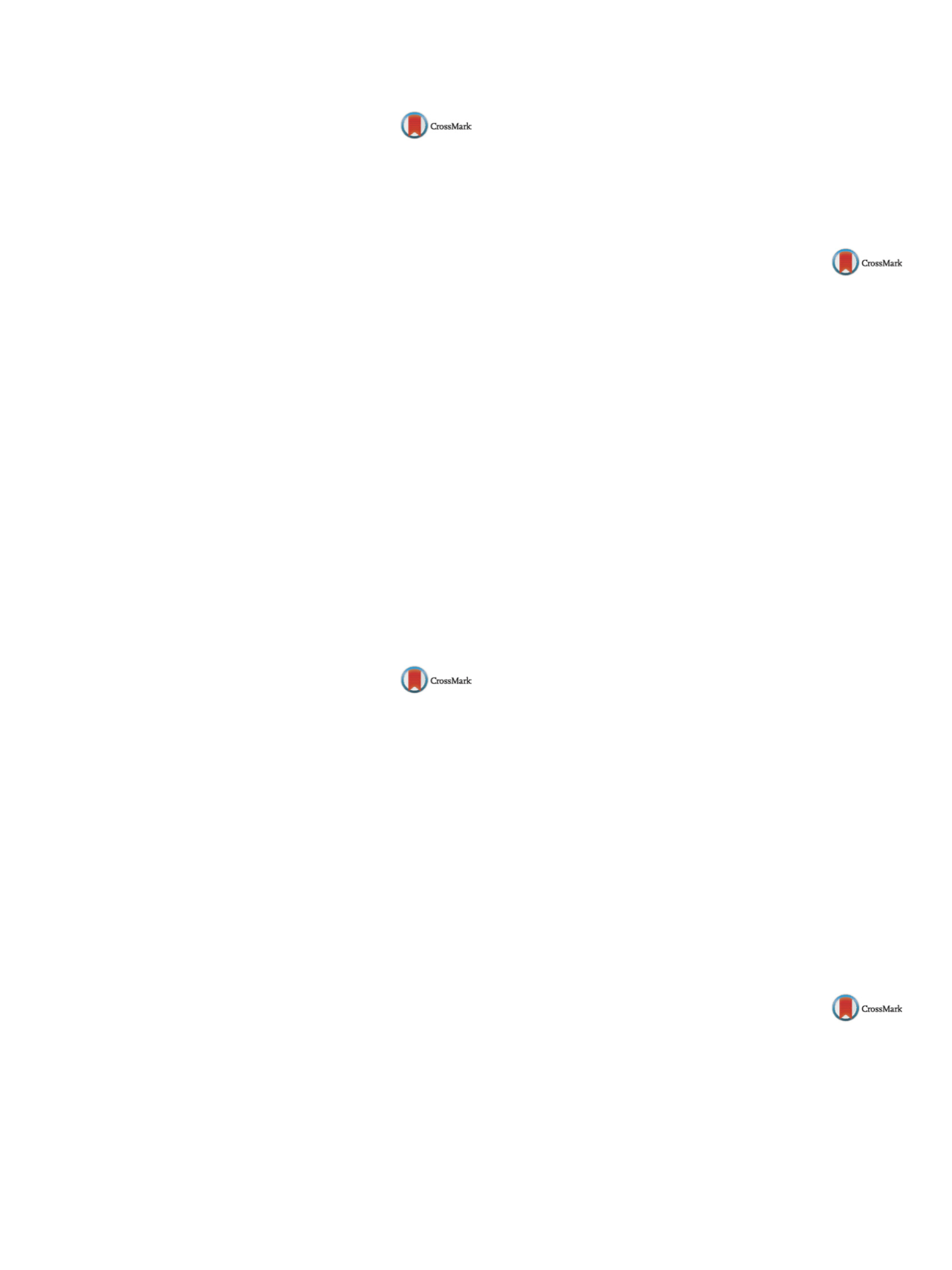

25th European Congress of Psychiatry / European Psychiatry 41S (2017) S710–S771
S745
EV1048
Psychiatric patients show different
coping styles during aggression
compared to controls
S. Orlando , G. Callovini , B. Altavilla , L. D’Ambrosio , F. Iasevoli
∗
University of Naples Federico II, Department of Neuroscience,
Reproductive Sciences and Odontostomatology, Naples, Italy
∗
Corresponding author.
Introduction
Aggression and violence are common phenomena,
potentially experienced by everyone.
Objectives
To demonstrate that coping patterns to face aggres-
sion and violence may exhibit differential group features.
Aims
To find differences in coping styles during moments of high
aggression in psychiatric patients compared to non-affected con-
trols.
Methods
We evaluated 34 outpatients fromthe section of psychi-
atry of university Federico II of Naples by two psychometric scales:
AQ to evaluate aggression levels and Brief-COPE for coping patterns.
Outcomes were compared with that of 34 non-affected controls,
recruited from the university student population. Pearson’s corre-
lation was used to find relationships between aggression levels and
coping skills in these two groups.
Results
We found significant differences between groups in mul-
tiple scale items and in the correlation measures, e.g. the use of
expression was completely reversed in this two samples according
to aggression levels.
Conclusions
These results show that aggression is experienced
differentially and with different coping styles by psychiatric
patients compared to non-affected controls.
Disclosure of interest
The authors have not supplied their decla-
ration of competing interest.
http://dx.doi.org/10.1016/j.eurpsy.2017.01.1378EV1049
Cognitive dysfunction in acute
psychosis
O. Mulligan
∗
, W.T. Tan , G. Lowry , D. Adamis
Sligo Mental Health Services, Psychiatry, Sligo, Ireland
∗
Corresponding author.
Introduction
Patientswithpsychosis oftenpresentwith cognitive
dysfunction during the course of their illness. Inflammatory mark-
ers such as cytokines and neurotrophins have been investigated, as
they are relevant to the change in cognitive function.
Objectives
To evaluate the cognitive function between patients
with acute psychosis and those without. Moreover, this study also
investigates cytokines and neurotrophins levels in acute psychosis
and their relation with cognition, severity of psychosis and trajec-
tory of their levels across time and under treatment.
Methods
Longitudinal, observational, pilot study, of psychiatric
inpatients. Participants were assessed on the first day using brief
psychiatric rating scale, CAGE, trail making test B and Wisconsin
card sorting test. These assessments were repeated weekly until
patients were discharged. Blood samples were also collected on
the same day for cytokines and neurotrophins analysis. However,
the result on cytokines and neurotrophins levels is still pending,
therefore only clinical findings will be presented.
Results
Thirty-one patients (mean age: 43.7, SD: 18.9, 14
females and 17 males) were recruited. Eleven were acutely psy-
chotic. Generalized estimating equations modelling were used
to compare these two groups based on cognitive and demo-
graphic variables. Patients with psychosis are more likely to
have significantly lower scores for CAGE (Wald-x2 = 6.268, df = 1,
P
= 0.012), significantly more abnormal scores in Trail Making
Test B (Wald–x2 = 7.338, df = 1,
P
= 0.007), failure to maintain
set (Wald–x2 = 8.323, df = 1,
P
= 0.004) and perseveratives errors
(Wald-x2 = 4.385, df = 1,
P
= 0.036) although they have more years
of education than those without psychosis.
Conclusions
These data show individuals with acute psychosis
have impaired cognitive function compared to others.
Disclosure of interest
The authors have not supplied their decla-
ration of competing interest.
http://dx.doi.org/10.1016/j.eurpsy.2017.01.1379EV1050
Insomnia and aggressiveness in
affective disorders: Self-assessment
versus clinical examination
M. Nascimento
1 ,∗
, M. Lázaro
1, J. Reis
2, G. Pereira
3, F. Bacelar
1,
A. Nobre
11
Centro Hospitalar Psiquiátrico de Lisboa, Clínica 5, Affective
Disorders and OCD, Lisbon, Portugal
2
Centro Hospitalar do Algarve, Psiquiatria, Faro, Portugal
3
Centro Hospitalar Psiquiátrico de Lisboa, Clínica 4, Lisbon, Portugal
∗
Corresponding author.
Introduction
Although, disturbances of sleep, as well as aggres-
siveness, have been described in patients with mood disorders,
these patients may not be aware of them.
Objectives/aims
To access the personal perception of sleep, dis-
turbances and aggressiveness in patients with mood disorders,
admitted to an acute psychiatric ward.
Methods
Diagnostic data (ICD-10: F31–33), includingmood eval-
uation, were prospectively collected for all patients admitted at
the affective disorder ward at Centro Hospitalar Psiquiátrico de
Lisboa (Portugal), during the third trimester of 2016. Then, 2 auto-
questionnaires – Athens insomnia scale (AIS) and Buss and Perry
aggression scale (both validated to the Portuguese population) –
were applied to these patients. Statistical analysis was performed
for possible correlations between patients’ mood and the question-
naires’ scores, using R software.
Results
Thirty-eight patients admitted were enrolled in this
study: 28with bipolar disorder (19manic, 4 depressive and 5mixed
episodes), and 10 with depressive disorder. Depressed patients
presented statistically higher values in the AIS (average = 20), com-
pared to manic (14) and mixed ones (17.2) (
P
= 0.031). However,
there were no statistical differences found between depressed
patients (bipolar versus non-bipolar). Even though manic patients
presented an increased average score in the Buss and Perry ques-
tionnaire (both total–65; but also sub-scores), these values were
not significantly different than depressed (60) or mixed patients’
scores (57.4).
Conclusions
Even though some symptoms (like sleep or aggres-
siveness) seem to be relevant to the clinics, patients with affective
disorders donot seemto be aware these disturbances, and therefore
are not able to acknowledge their relevance.
Disclosure of interest
The authors have not supplied their decla-
ration of competing interest.
http://dx.doi.org/10.1016/j.eurpsy.2017.01.1380EV1051
Assessment of empathy and
psychological characteristics of
smokers
G. Iatrou
1 ,∗
, K . Gourgoulianis
1 , E. Kotrotsiou
2 , M.Gouva
3 ,S. Kotrotsiou
2, T. Paralikas
21
University of Thessaly, Medicine, Larissa, Greece
2
University of Applied Sciences of Thessaly, Nursing-Postgraduate
Program in Mental Health-Research Laboratory of Care, Larissa,
Greece
3
University of Applied Sciences of Epirus, Nursing-Research
Laboratory Psychology of Patients Families and Health Professionals,
Larissa, Greece


















